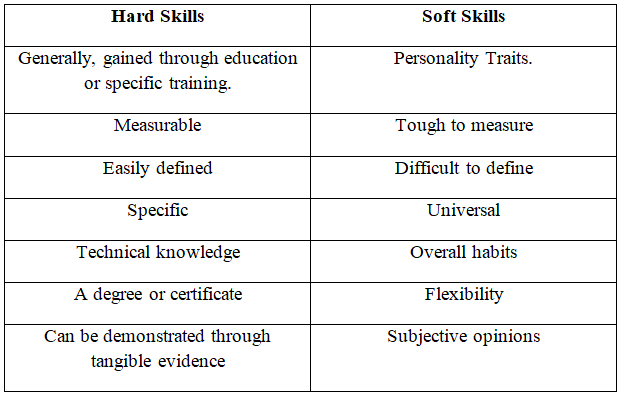
In general, employees are being employed on various grounds that they have certain features. These features make them the accurate candidate for the work. In job descriptions as well, employers frequently ask for a mixture of hard and soft skills. Both types of skills are necessary to successfully perform and advance in most jobs.
But what’s the precise difference between hard and soft skills? Let’s have a look ---
Hard Skills
Hard skills are quantifiable and teachable. For example, you may track down someone's hard skills noted as “technical skills” or “technical abilities.” It can be bilingual or multilingual.
A few instances of hard abilities include:
And so on… Generally, hard skills are the technical knowledge that you have gained through your life experience, including your career or education.
Soft Skills
Soft skills are usually the general characteristics, applicable to personality individualities. For example, if an employer value association in his/her company, he/she want to hire employees who are great team players with good communication skills.
A few instances of soft skills embrace:
There are more though! These are the personal habits and traits that shape how a person works along with others. Some recruiters or HR personnel might describe these ambiguously as “people skills.”
So, what’s the difference between hard skills and soft skills?
Here are the major differences between these two ---

How to embrace hard and soft skills on your resume/cv?
Try to consider counting a “Skills” segment that highlights your aptitudes most related to the position. This is particularly significant for spots with specific technical skills requirements. Remember, carefully review the job posting you’re applying for.
This will help you to decide on what to include and arrange in your skills section. If you are wondering where to find employers specific hard and soft skills requirements, check the “requirements,” “education” or “desired skills” sections of the post. Both skills are necessary to find career accomplishment.
The best thing is you can learn and develop both hard and soft skills prior to applying for jobs with the help of online facilitation skills training program.
A Carnegie Mellon Foundation study found that 75% of long-term job success depends on the level of soft skills workforces had.
One more LinkedIn study found that 57% of employers value soft skills more than hard skills when making new hires.
You might be wondering why soft skills are so essential for a fruitful career! Here are some of the important benefits of soft skills.
Advantages of Soft Skills Training
The following are some of the top advantages that businesses have seen in applying soft skills training:
1. Improved customer satisfaction
2. Enhanced employee retention rates
3. Better teamwork
4. Improved sales
5. Advanced productivity
The most effective approach to showcase your hard and soft skills is to share explicit stories from your experience that relays to the requirements of the job you’re interviewing for.
Why are hard skills significant to train for?
Hard skills are the backbone of the services your business delivers or the products it generates. Hard skills training safeguards that your employees are prepared to do good work in their arena. Which training is needed, this depends on your employees and what skills they need.
Here, training needs analysis may help identify specific hard skills, which can then aid you to decide which approach will work best. The objective is to deliver hard skills training that is applicable, engaging, and helpful to the kinds of hard skills your employees need to do their job. You can do this through the train the trainer program!
While considering new hires, numerous companies look first to see if that employee has the practical knowledge to do the job. Generally, in job descriptions, employers frequently ask for a grouping of hard and soft skills.
Written By : Park Jin Ae
Centre For Training & Professional Development (CTPD) - The Trading brand of TTA Training Private Limited, India is a ISO 9001:2015 Company




© 2021 - Centre For Training & Professional Development (CTPD). All Rights Reserved. Centre For Training & Professional Development (CTPD) trading brand of TTA Training Pvt. Ltd (India) - CIN U80902WB2016PTC215839, Asia Teachers Training Co., Ltd (Thailand) - Registration No. 0105558193360 & Asian College Of Teachers Ltd (UK) - Company Number 9939942 & Asian College Of Teachers LLC, (USA) - Federal Tax Identification Number 30-1261596
Designed by kreativewebtech